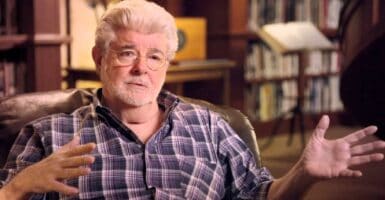An American Pickle Review: It Falls Apart When It Gets Political
Yes, the plot of An American Pickle revolves around a man who was accidentally pickled for a century.
This article is more than 2 years old
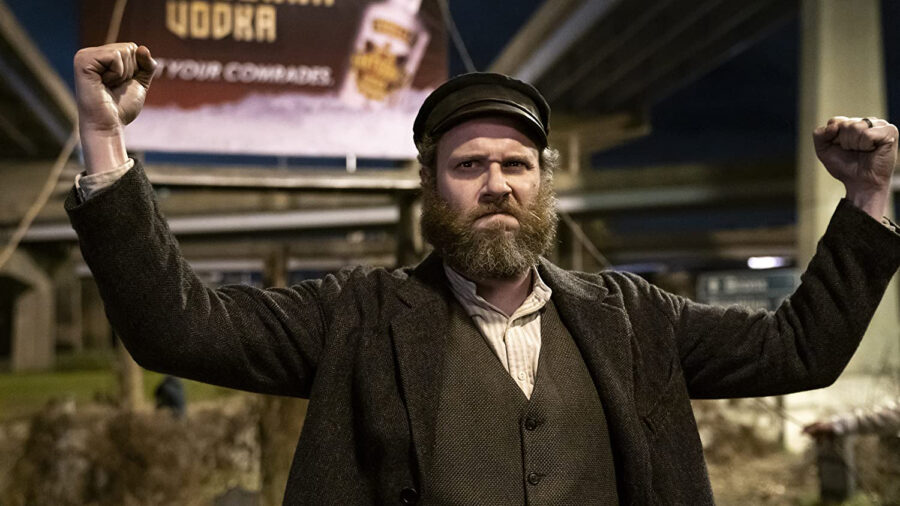
It’s 1919 and Jewish immigrant Herschel Greenbaum (Seth Rogen) is hard at work at his “good job” of smashing rats with a club at a Brooklyn pickle factory. When the rodents unite and rise up against him, he tumbles into a pickle vat, where he is brined, preserved, and forgotten. 100 years later he wakes up to find everything he knew and loved is gone, the world is a very different place, and the only family he has left is his great-grandson, Ben (also Rogen), a caricature of a hipster app developer. Such is the world of director Brandon Trost’s An American Pickle.
Yes, the plot revolves around a man who was accidentally pickled for a century. Yes, it’s silly. And yes, it’s a big ask to just roll with it. But An American Pickle is also well aware of this absurdity and pokes fun at itself. In an early press conference scene, Herschel says, “The scientist explains. His logic is good. It satisfies everyone.” That’s all the time the script from Simon Rich, who also wrote the short story on which it’s based, wastes trying to explain the unexplainable.
Though it’s patently ridiculous, at its heart An American Pickle, as the title suggests, is a thoroughly American story. That is to say, an immigrant story. Herschel and his beloved Sarah (Sarah Snook), come to the U.S. hoping for a better life, hoping their descendants will have a better life. At its core, this story is optimistic about the American Dream, what it is and what it can be, for good and for ill.
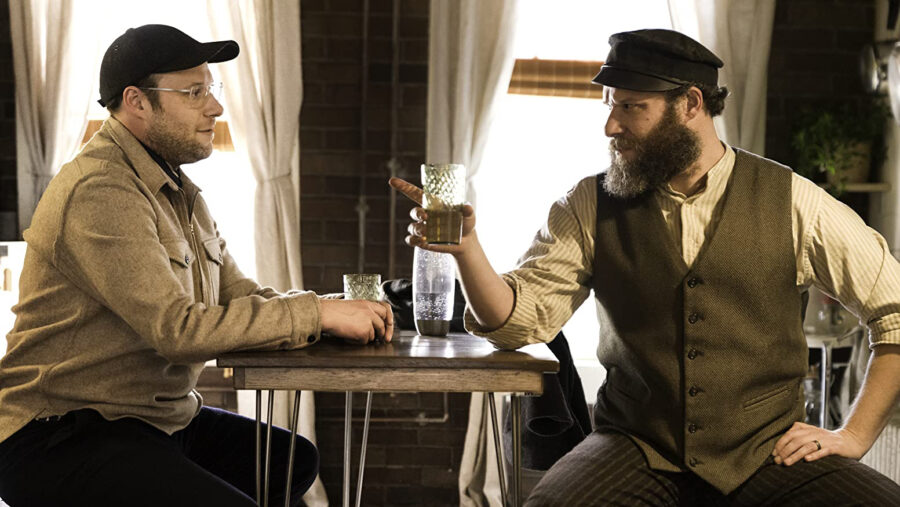
Beyond that, this is a sweet, earnest fish-out-of-water yarn. Herschel stands in awe of what his family and the world have become, at the same time he’s disappointed in both. Ben and Hershel bond over shared grief and loss—Ben lost his parents, Herschel’s grandson, in a car crash—and the two navigate a new world of family, faith, and the artisan, old-world pickles Herschel makes out of 100% dumpstered ingredients.
When it’s this, An American Pickle works best. Trost, primarily known as a prolific cinematographer (though he directed the bonkers, semi-post-apocalyptic weirdness that is The FP), balances the comedic tone with the more maudlin sensibilities. It’s warm and affecting, all carried by a fantastic performance by Rogen.
Without the star this wouldn’t work and Seth Rogen sells An American Pickle. If this isn’t his best performance, it’s up there. Ben is the goofy, slacker-with-a-heart-of-gold Rogen can play in his sleep, but he balances this out with Herschel’s old-time self-seriousness and intentionally vague Eastern European accent. It doesn’t take much more than a scene to get past the fact that this is the same actor and simply accept these two distinct characters. (At one point, Rogen plays Herschel playing Ben, which is a hoot.)
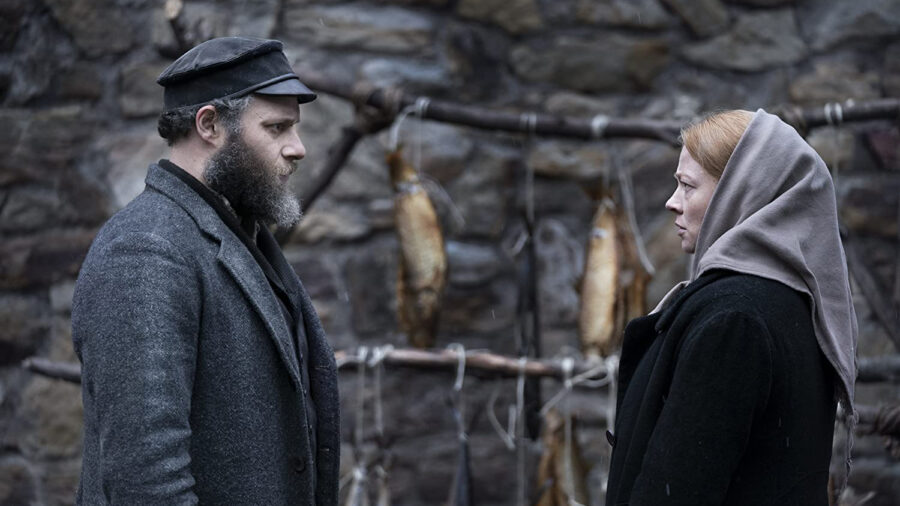
This general conceit forms the first act and the final act of An American Pickle. What it bookends, however, is a clunky mess full of strange choices and a film that doesn’t know what it is, wants to be, or say.
What begins and ends as a peculiar tale of culture shock takes a sharp turn, trying its hand at social/political satire. The results are… less than stellar. A lot happens in the second act, a lot. Herschel starts a pickle business, becomes a meme, finds success, becomes a pariah, then an inadvertent right-wing mouthpiece then a fugitive from the law.
One thing after another, the script tosses these complications, and more, at the viewer. It’s a chaotic assault on the senses as the narrative leaps from one scenario to the next to the next. Beneath all of this, An American Pickle attempts to say something about social media, internet trolls, MRAs, and more. It’s unfocused and clumsy and mixed in what ait ctually communicates. (Cancel culture is bad? But also, maybe cancel culture doesn’t actually exist?)
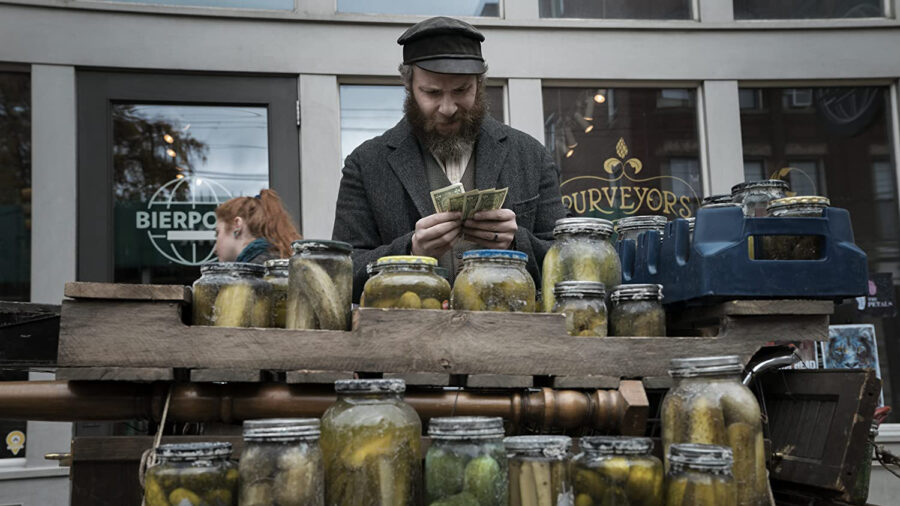
While the plot and tone of An American Pickle make this uneven shift, so, too, does Ben. At this same point, he turns mean-spirited and vindictive out of nowhere, sabotaging Herschel at every turn—the manufactured strife does not come close to explaining his behavior. It’s whiplash-inducing and the severity doesn’t mesh with the rest of his character—at one point, he practically tents his fingers like Mr. Burns.
In the end, An American Pickle leaves the sensation of one movie wrapped around another. While one of these films is confident and successful at what it attempts, the other is not. What works, works well, but what doesn’t, is puzzling. An American Pickle is ambitious and posits big ideas, even when it doesn’t deliver. But a fantastic performance from Seth Rogen, an intriguing character in Herschel, and heartfelt mediations on grief and family are enough to warrant a watch.











